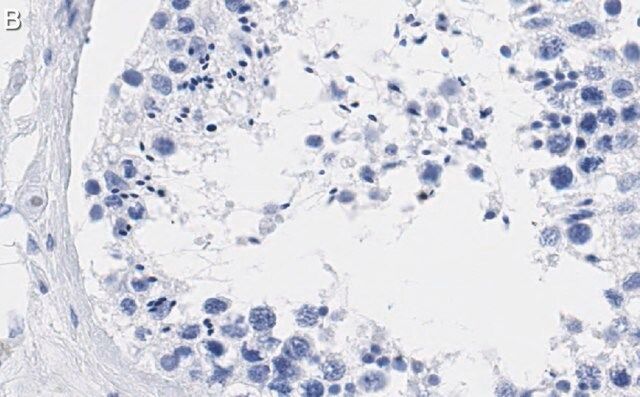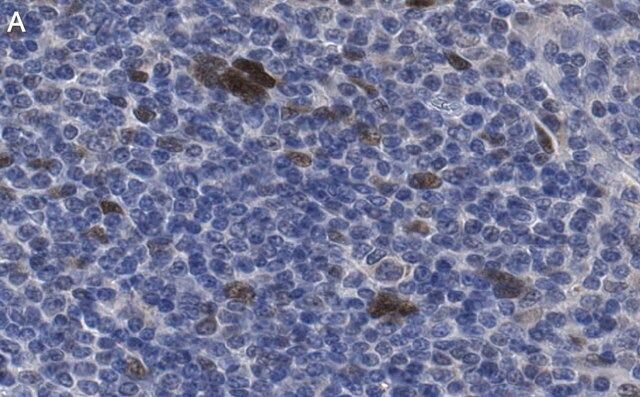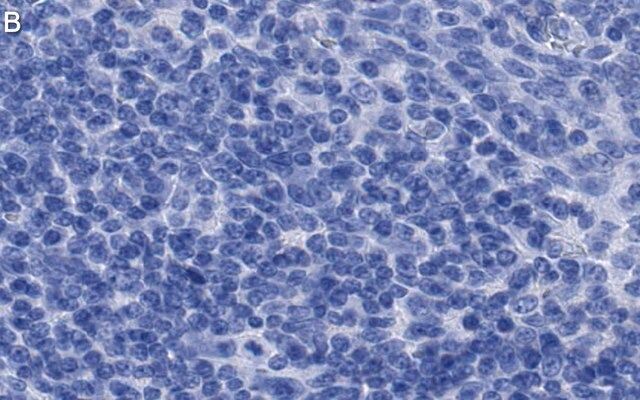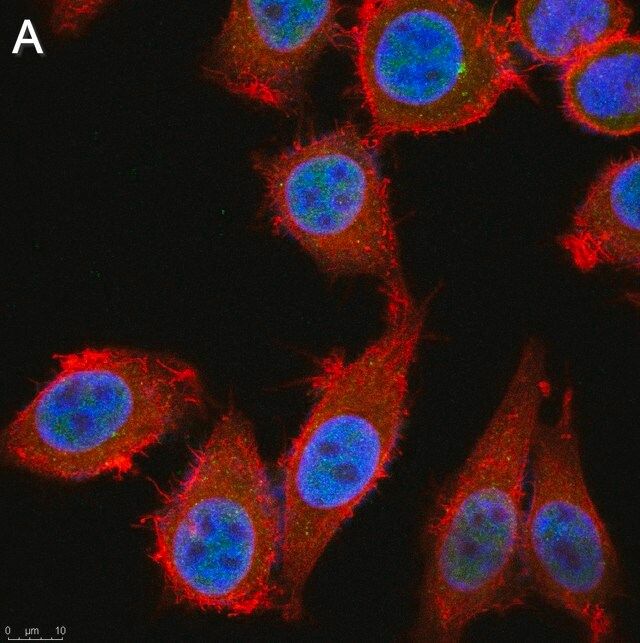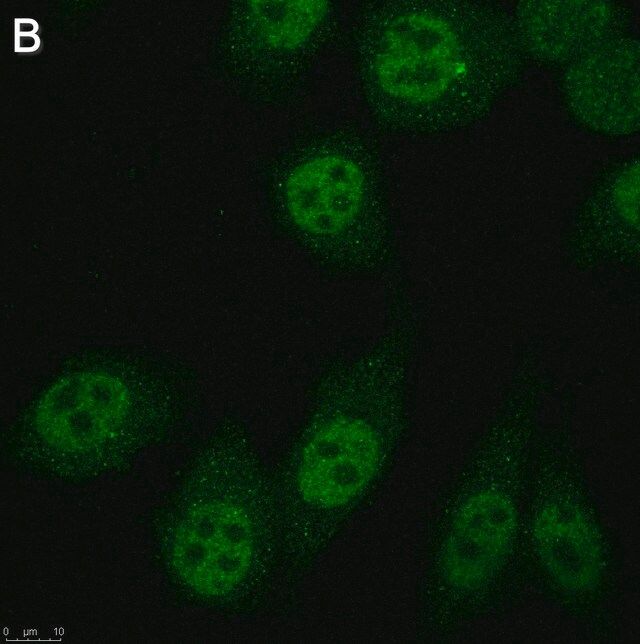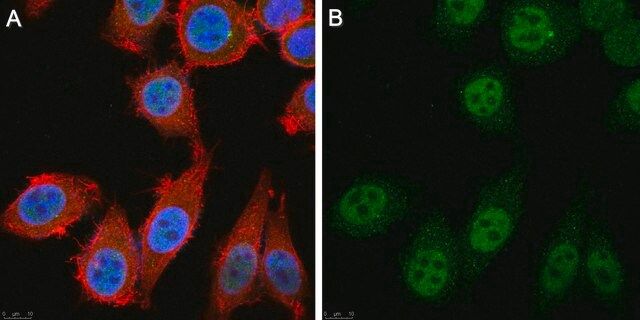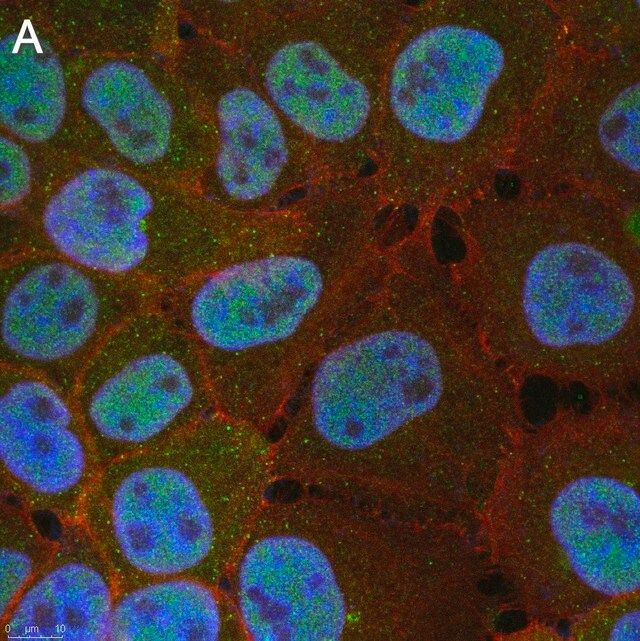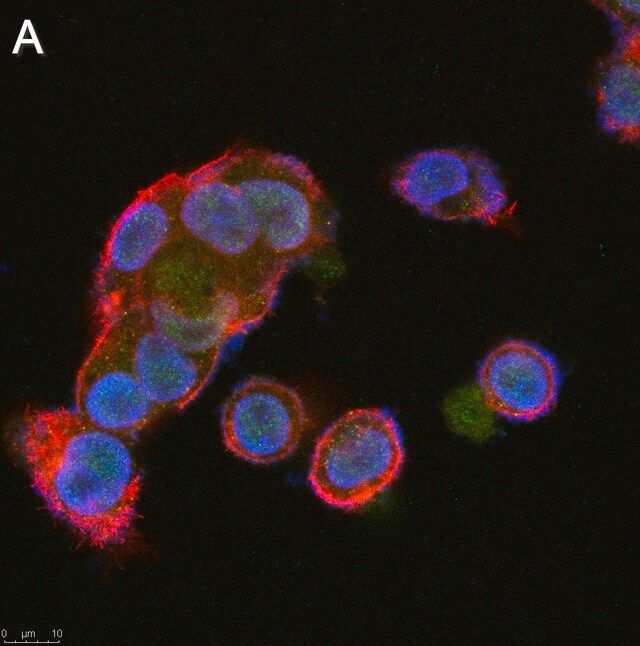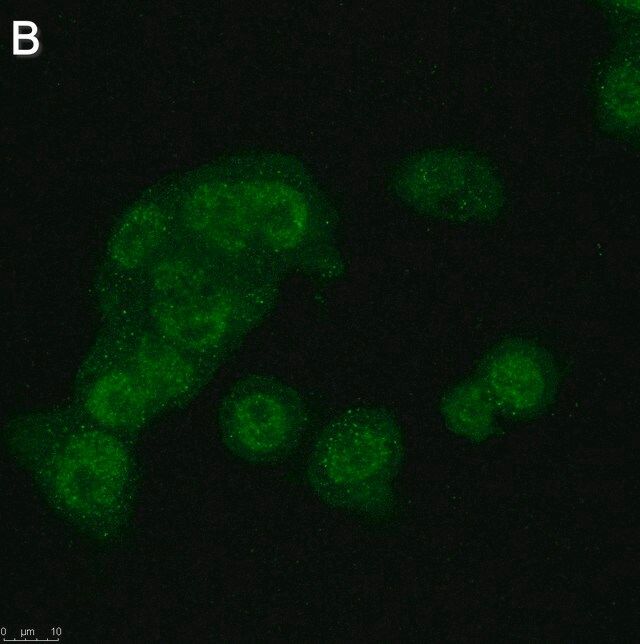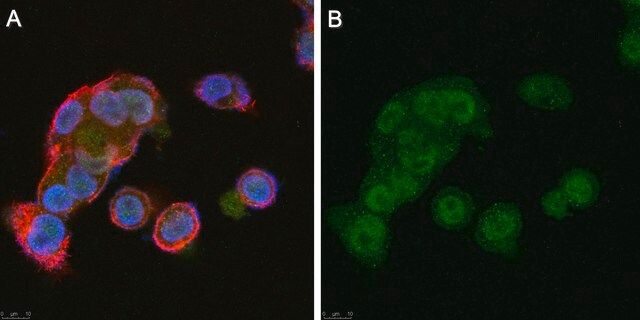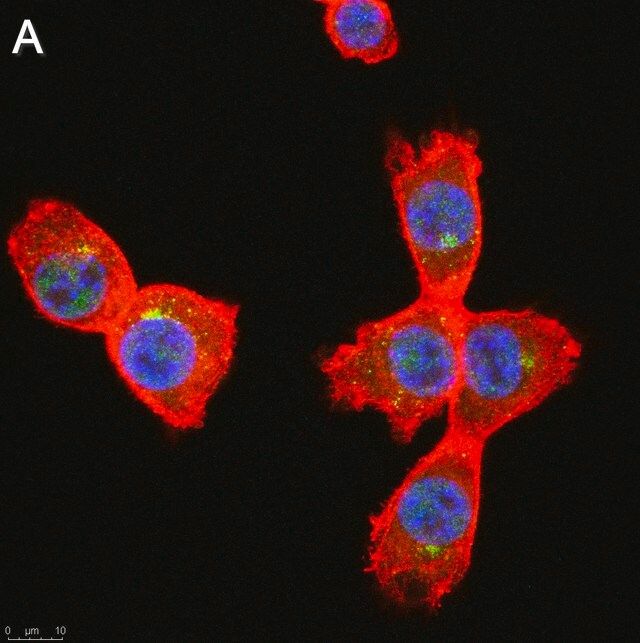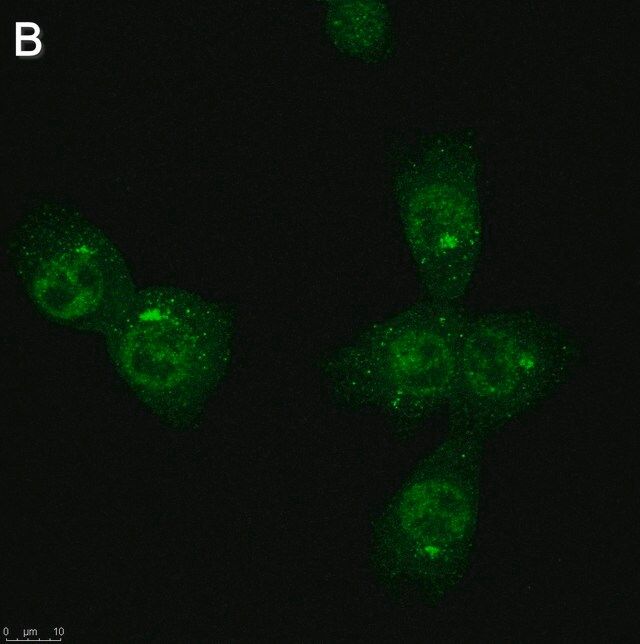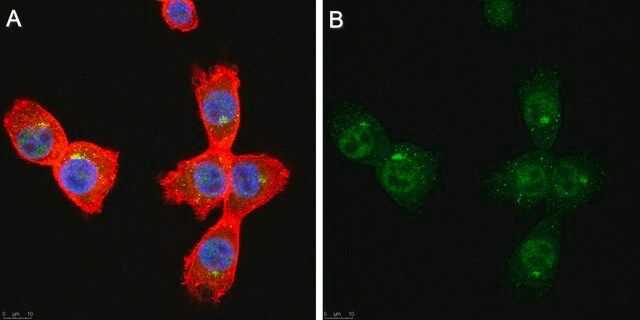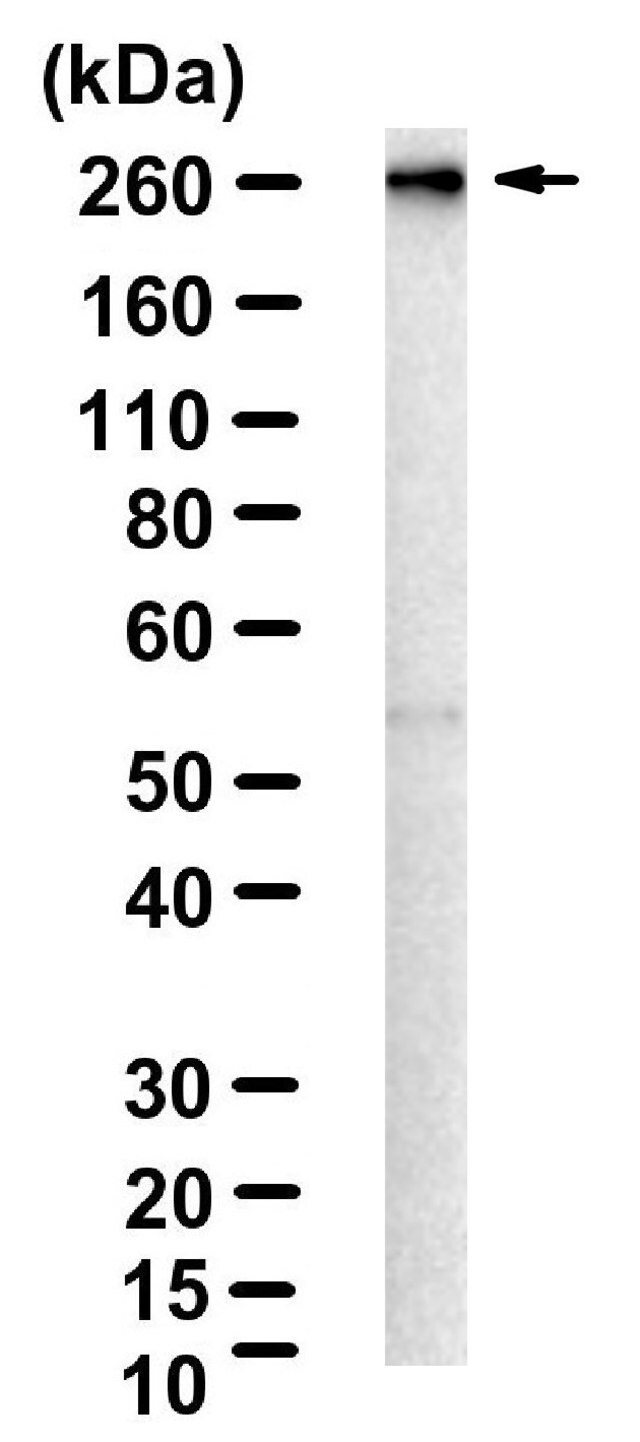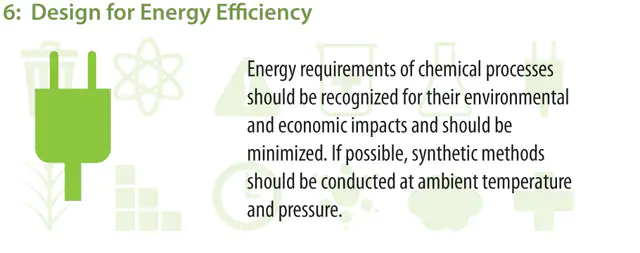您的位置:首页 > 产品中心 > Anti-ATR Antibody, clone 1B15 ZooMAb® Rabbit Monoclonal
Anti-ATR Antibody, clone 1B15 ZooMAb® Rabbit Monoclonal
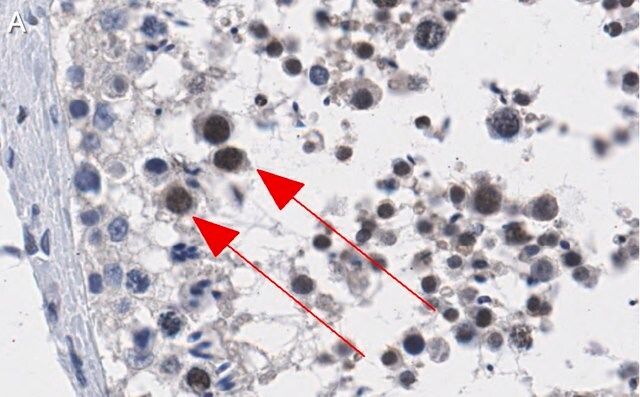


产品别名
Anti-ATR Antibody, clone 1B15 ZooMAb® Rabbit Monoclonal
Serine/threonine-protein kinase ATR;EC:2.7.11.1;Ataxia telangiectasia and Rad3-related protein;FRAP-related protein 1
产品性质
| Quality Level【质量水平】 | 200 |
| biological source【生物来源】 | rabbit |
| recombinant【重组】 | expressed in HEK 293 cells |
| conjugate【偶联物】 | unconjugated |
| antibody form【抗体形式】 | purified antibody |
| antibody product type | primary antibodies |
| clone【克隆】 | 1B15, recombinant monoclonal |
| description【描述】 | recombinant, expressed in HEK 293 cells |
| product line【产品线】 | ZooMAb® learn more |
| form【形式】 | lyophilized |
| mol wt【分子量】 | calculated mol wt 301.37 kDa observed mol wt ~260 kDa |
| purified by【纯化方式】 | using Protein A |
| species reactivity | mouse, human, rat |
| species reactivity (predicted by homology) | monkey |
| packaging【包装】 | antibody small pack of 25 μL |
| greener alternative product characteristics【环保替代产品特性】 | Waste Prevention Designing Safer Chemicals Design for Energy Efficiency Learn more about the Principles of Green Chemistry. |
| enhanced validation【增强验证】 | recombinant expression Learn more about Antibody Enhanced Validation |
| technique(s) | affinity binding assay: suitable immunocytochemistry: suitable immunohistochemistry (formalin-fixed, paraffin-embedded sections): suitable western blot: suitable |
| isotype【同位素/亚型】 | IgG |
| epitope sequence【表位序列】 | N-terminal |
| Protein ID accession no.【Protein ID登记号】 | NP_001175 |
| UniProt accession no.【UniProt登记号】 | Q13535 |
| greener alternative category【环保替代产品分类】 | |
| shipped in【运输】 | ambient |
| storage temp.【储存温度】 | 2-8℃ |
基本信息
| General description【一般描述】 | ZooMAb® antibodies represent an entirely new generation of recombinant monoclonal antibodies.Each ZooMAb® antibody is manufactured using our proprietary recombinant expression system, purified to homogeneity, and precisely dispensed to produce robust and highly reproducible lot-to-lot consistency. Only top-performing clones are released for use by researchers. Each antibody is validated for high specificity and affinity across multiple applications, including its most commonly used application. ZooMAb® antibodies are reliably available and ready to ship when you need them. |
| Specificity【特异性】 | Clone 1B15 is a Rabbit recombinant monoclonal antibody that detects ATR. It targets an epitope within 22 amino acids from the N-terminal region. |
| Immunogen【免疫原】 | KLH-conjugated linear peptide corresponding to 22 amino acids from the N-terminal region of human ATR. |
| Application【应用】 | Quality Control Testing Evaluated by Western Blotting in nuclear extract of NIH3T3 cells. Western Blotting Analysis (WB): A 1:10,000 dilution of this antibody detected ATR in nuclear extract of NIH3T3 cells. Tested applications Immunohistochemistry (Paraffin) Analysis: A 1:100 dilution from a representative lot detected ATR in human testis and human tonsil tissue sections. Affinity Binding Assay: A representative lot of this antibody bound ATR with a KD of 6.8 x 10-8 in an affinity binding assay. Immunocytochemistry Analysis: A 1:100 dilution from a representative lot detected ATR in HeLa, A431, HepG2 and NIH 3T3 cells.. Note: Actual optimal working dilutions must be determined by end user as specimens, and experimental conditions may vary with the end user |
| Physical form【外形】 | Purified recombinant rabbit monoclonal antibody IgG, lyophilized in PBS, 5% Trehalose, normal appearance a coarse or translucent resin. The PBS/trehalose components in the ZooMAb formulation can have the appearance of a semi-solid (bead like gel) after lyophilization. This is a normal phenomenon. Please follow the recommended reconstitution procedure in the data sheet to dissolve the semi-solid, bead-like, gel-appearing material. The resulting antibody solution is completely stable and functional as proven by full functional testing. Contains no biocide or preservatives, such as azide, or any animal by-products. Larger pack sizes provided as multiples of 25 μL. |
| Reconstitution【重悬】 | 300 μg/mL after reconstitution at 25 μL per vial. Please refer to guidance on suggested starting dilutions and/or titers per application and sample type. |
| Legal Information【法律信息】 | ZooMAb is a registered trademark of Merck KGaA, Darmstadt, Germany |
产品说明
| Target description【目标描述】 | Serine/threonine-protein kinase ATR (UniProt: Q13535; also known as EC:2.7.11.1, Ataxia telangiectasia and Rad3-related protein, FRAP-related protein 1) is encoded by the ATR (also known as FRP1) gene (Gene ID: 545) in human. ATR is a serine/threonine protein kinase of the phosphatidyl inositol 3-kinase-like kinase (PIKK) family that is activated in response to DNA damage. It activates checkpoint signaling upon genotoxic stresses such as ionizing radiation, ultraviolet light, or DNA replication stalling. It is shown to bind to UV-damaged DNA with higher affinity. It forms a heterodimer its binding partner, ATR-interacting protein (ATRIP), and this heterodimer is recruited to stalled forks through direct interactions with the replication protein A-single-stranded DNA (RPA-ssDNA) complex that forms at stressed replication forks. In ssDNA bound form its kinase activity is stimulated by the ATR-activating domains of topoisomerase II binding protein 1 (TOPBP1) or Ewing tumor-associated antigen 1 (ETAA1), which are independently recruited to junctions between ssDNA and double-stranded DNA (dsDNA) and to RPA-ssDNA, respectively. ATR is reported to phosphorylate a number of substrates, including BRCA1, CHEK1, MCM2, RAD17, RPA2, and p53/TP53, which are known to collectively inhibit DNA replication and mitosis and promote DNA repair or induce apoptosis in severely damaged cells. Defects in ATR signaling are commonly seen in human cancers and affect the sensitivity of tumors to DNA-damaging chemo- and radiation therapies. This ZooMAb® recombinant monoclonal antibody, generated by our propriety technology, offers significantly enhanced specificity, affinity, reproducibility, and stability over conventional monoclonals. (Ref.: Moiseeva, TN., et al. (2019). Proc. Natl. Acad. Sci. USA. 116(27); 13374-13383; Saldivar, JC., et al. (2017). Nat. Rev. Mol. Cell Biol. 18(10); 622-636). |
| Storage and Stability【储存及稳定性】 | Recommend storage of lyophilized product at 2-8℃; Before reconstitution, micro-centrifuge vials briefly to spin down material to bottom of the vial; Reconstitute each vial by adding 25 μL of filtered lab grade water or PBS; Reconstituted antibodies can be stored at 2-8℃, or -20℃ for long term storage. Avoid repeated freeze-thaws. |
| Disclaimer【免责声明】 | Unless otherwise stated in our catalog or other company documentation accompanying the product(s), our products are intended for research use only and are not to be used for any other purpose, which includes but is not limited to, unauthorized commercial uses, in vitro diagnostic uses, ex vivo or in vivo therapeutic uses or any type of consumption or application to humans or animals. |
安全信息
| Storage Class Code【储存分类代码】 | 13 - Non Combustible Solids |
| WGK | WGK 1 |





